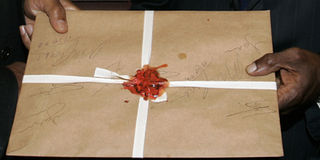Ocampo reveals poll chaos evidence

Former UN Secretary General Kofi Annan's (R) hands are seen as he receives a sealed envelope, the report on Kenya's post election violence in 2007 from Justice Philip Nyamu Waki, head of the Commission of Inquiry into the Post Election Violence. It is one of the reports that forms the backbone of the evidence that Mr Moreno-Ocampo has now made public. Photo/FILE
International Criminal Court prosecutor Luis Moreno-Ocampo relied on reports by human rights agencies and the Waki Commission to bolster his evidence against The Hague Six, according to released documents.
Mr Moreno-Ocampo began disclosing the evidence he used to build cases against suspended minister William Ruto, Tinderet MP Henry Kosgey and radio presenter Joshua Sang on Monday.
He released 58 documents to the lawyers of the three suspects.
The reports on post-election violence by the Kenya National Commission on Human Rights (KNCHR), Waki Commission, Human Rights Watch and Amnesty International form the backbone of the evidence that he has now made public as defence teams prepare to puncture his cases.
In a letter to the Pre-Trial Chamber judges dated May 9, Mr Moreno-Ocampo said the evidence he had disclosed would not endanger the witnesses and victims. The documents, he said, did not require to be edited to conceal some facts.
“The prosecution is disclosing within the deadline established by the Second Disclosure Decision all the material that can be submitted without jeopardising the safety and well-being of witnesses, victims and other persons at risk,” he said.
First documents
On Wednesday, lawyer Joseph Kigen-Katwa, who represents Mr Ruto and Mr Sang, said they received the documents on Monday, which he described as “background evidence”.
“He sent to us the first documents which include reports by the Kenya National Commission on Human Rights, Human Rights Watch and others of the sort. They are documents that are in the public domain,” he said.
Mr Moreno-Ocampo has been ordered by Pre-Trial Chamber judge Ekaterina Trendafilova to disclose the evidence in her Tuesday ruling that rejected the prosecutor’s application for an extension of time of disclosure. (DOWNLOAD: ICC ruling on Ocampo evidence)
While releasing the first documents, the prosecutor protested that the timelines were denying his office the right to a fair trial.
“It will force the prosecution to disclose the majority of its evidence more than three months in advance of the legal deadline.
“The prosecution reiterates that the current calendar for disclosure of material that requires redaction is affecting the prosecution’s right to a fair trial,” he said.
Under the calendar set by judge Trendafilova, the prosecutor is to release to defence lawyers evidence collected before December 15, 2010, this Friday.
The second phase of the disclosure, set for June 3, will be on evidence gathered between December 15, 2010, and March 31, this year. The evidence collected after March will be disclosed on July 8.




